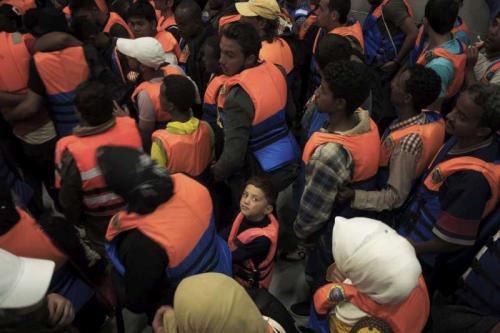UN calls for boosted search, rescue efforts as migrants die of hypothermia in Mediterranean
The United Nations refugee agency (UNHCR) has urged European nations to ramp up search and rescue missions in the Mediterranean Sea following the region’s first major maritime tragedy this year in which dozens of people perished, apparently from hypothermia.

A young boy surrounded by adults after being rescued in June 2014 from a boat on the Mediterranean Sea.
Twenty-nine migrants were reported dead off the coast of Libya the day before during an attempt to cross the Mediterranean over to Europe. UNHCR said it is both deeply saddened by the news and concerned by the manner of the deaths – “all but seven of which appear to have occurred on board the rescue vessel, with people dying of hypothermia.” Some 100 migrants were rescued when the Italian Coast Guard succeeded in reaching the distressed vessel despite the turbulent waters.
“While we applaud all involved in the rescue effort – which took place in high seas and poor weather conditions and resulted in 106 lives being saved – this is an example of why it was felt important in October 2013, following tragedies that occurred then, to underline the need for a much more effective and improved rescue capacity in the Mediterranean to cope with the scale of the problem,” said UNHCR spokesperson Adrian Edwards in a press release.
Migrant crossings in the Mediterranean have spiked in the first few weeks of 2015 with UNHCR reporting the numbers as being “significantly higher” compared to the same period last year. In January alone, the agency added, 3,528 arrivals were reported in Italy compared to 2,171 in January last year. Meanwhile, 2015 has already seen 50 deaths, including the lives lost the day before, compared to the 12 recorded by this point last year.
As conflict continues to flare in Syria, Libya and across the Middle East, refugees are increasingly resorting to irregular migration, paying vast sums of money and frequently succumbing to the whims of human traffickers in order to flee zones of crisis for Europe’s shores. The bulk of these migrants arrive in Italy. By the end of August 2014, for instance, more than 108,000 migrants had already landed on the Italian peninsula.
“Additionally worrying is that, with the incident, there are indications that more people were attempting to reach Italy last night,” Mr. Edwards continued.
The UNHCR spokesperson recalled that more than 218,000 people had crossed the Mediterranean in 2014 with an estimated 3,500 having lost their lives in the attempt. He added that the number “would have been higher if not for Italy’s Mare Nostrum” – the Italian Government’s rescue campaign which was replaced last year by a European Union operation named Triton.
While the “Mare Nostrum” rescue operation brought an array of Italian naval and coast guard vessels into the fold, permitting the rescue of distressed migrants stranded far from Europe’s shores, Triton remains more focussed on assisting those within range of the continent’s coastlines.
Mr. Edwards warned the European Union that Triton was “no replacement for proper search and rescue capacity” and called for European Governments to provide Italy with “proper support to deal with people making irregular crossings.”
Source: United Nations
- 254 reads
Human Rights
Ringing FOWPAL’s Peace Bell for the World:Nobel Peace Prize Laureates’ Visions and Actions

Protecting the World’s Cultural Diversity for a Sustainable Future

The Peace Bell Resonates at the 27th Eurasian Economic Summit

Declaration of World Day of the Power of Hope Endorsed by People in 158 Nations

Puppet Show I International Friendship Day 2020

